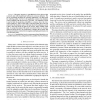Free Online Productivity Tools
i2Speak
i2Symbol
i2OCR
iTex2Img
iWeb2Print
iWeb2Shot
i2Type
iPdf2Split
iPdf2Merge
i2Bopomofo
i2Arabic
i2Style
i2Image
i2PDF
iLatex2Rtf
Sci2ools
INFOCOM
2000
IEEE
2000
IEEE
Admission Control Based on End-to-End Measurements
— This paper proposes a controlled-load service that provides a network state with bounded and well known worst-case behavior. The service is primarily developed for real-time applications. The full system for achieving quality of service to the application consists of an admission control combined with forward-error correction. The admission control is used to limit the packet-loss probability to a known value; the errorcontrol coding (i.e., FEC) is then used to raise the quality above the level enforced by the admission control. The basic idea for the admission control is that a host must probe the path to the receiver before sending actual data. It accepts the session if the probe is received with no or at most a moderate amount of loss. The performance evaluation shows clearly that the proposed scheme avoids network congestion and high packet losses even over short time scales. Keywords—Controlled-load service, measurement-based admission control, differentiated services, integ...
Admission Control | Communications | Controlled-load Service | INFOCOM 2000 | Measurement-based Admission Control |
| Added | 31 Jul 2010 |
| Updated | 31 Jul 2010 |
| Type | Conference |
| Year | 2000 |
| Where | INFOCOM |
| Authors | Viktória Elek, Gunnar Karlsson, Robert Rönngren |
Comments (0)

